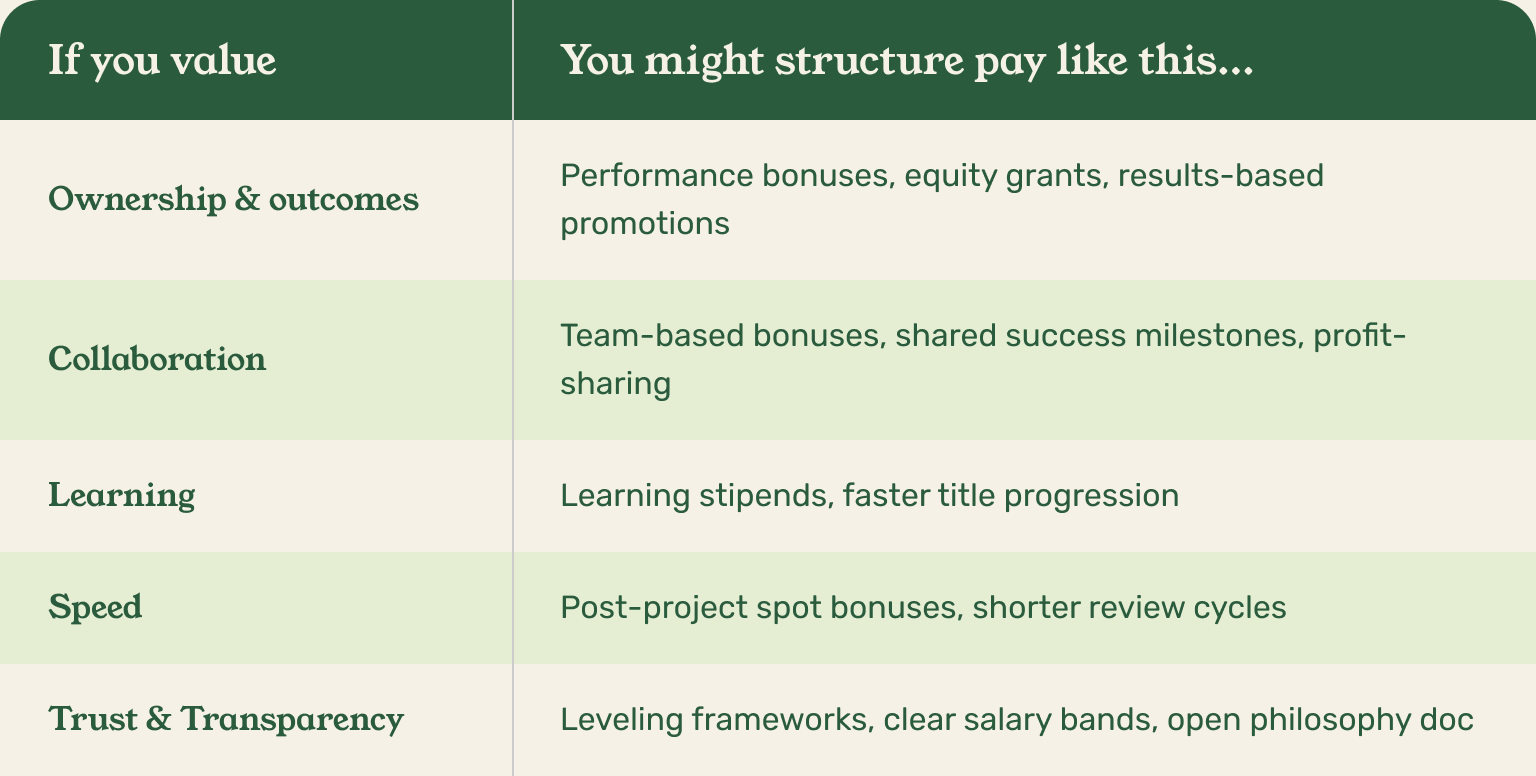Crafting Your Startup’s Compensation Philosophy

What Is a Compensation Philosophy (And Why Do You Need One)?
A compensation philosophy is the why behind how you approach pay - salary, equity, perks, bonuses, and more. It outlines what you reward, how you want to be seen as an employer, and what employees can expect in terms of comp decisions.
Short ‘n sweet is fine. It just needs to be clear, consistent, and intentional.
A thoughtful comp philosophy:
- Keeps you consistent across offers, raises, and levels
- Eliminates or reduces random or reactionary comp decisions
- Builds trust and helps you navigate those tough pay conversations with employees and candidates
⚠️ Heads up: This is not a full comp structure guide.
It’s a micro-guide focussed specifically on your philosophy — the why behind your pay decisions.
If you're looking for salary bands, benchmarking tools, or equity math… hang tight. A full guide on comp structure is in the works.
Let’s dive in…
Step 1: Define What You Want to Reward
Ask yourself:
- What behaviours or values matter at your company? What do we want to reinforce most?
(e.g. ownership, collaboration, speed, learning, etc) - Are you trying to reward individual achievement, team outcomes, and/or values-based behaviour?
- What do you not want to incentivize?
Then ask: How should compensation reflect this?

📌 Example:
“We know startup life isn’t always smooth, so we reward people who stay resourceful and push through uncertainty. Spot bonuses are awarded every quarter based on X, Y, Z…
Step 2: Choose Where You’ll Land Compared To The Market
This’ll depend on a bunch of factors (current and future funding, stage, industry, profitability, short & long term goals, etc). Where you’ll land is less important than why you land there.
Ask yourself:
- Do we want to (and can we realistically) pay above, at, or below market?
- Who are we competing with for talent?
- What are we offering beyond cash? (e.g. equity, flexibility, meaningful work)
🪵 Startup Tip:
If you’re paying below market, own it. Clearly explain what you do offer (flexibility, equity, purpose, etc.) and lean into those areas.
Step 3: Figure Out What Else Is Included In Total Comp
Beyond base salary, outline what else you want to offer folks:
- Equity or stock options
- Profit-sharing opportunities
- Bonuses (individual, team, milestone-based)
- Benefits (health, dental, retirement matching, etc.)
- Perks (remote work, time off, learning budgets, 4-day weeks)
Reminder: What you prioritize will depend on what came out of Step 1 👆
Step 4: Explain How Pay Decisions Are Made
This is where it gets messy for a lot of teams, mainly because they haven’t done much of the above work.
Since you - being a keener - have, all you’ve gotta do in this step is be clear about:
- Who decides pay (founders? HR? Finance?) and the approval process
- The why behind raises or comp changes (e.g. performance, tenure, scope, inflation, market shifts)
- How often you’ll review comp (e.g. annually? during promotions only?)
Step 5: Publish It
→ This makes it real (and usable by your team)
Keep it short. 1 page is plenty. Use it to guide:
- Offer letters
- Promotion decisions
- “Can I get a raise?” convos
TL;DR
Before you move on to building bands and spreadsheets, make sure you’ve:
✅ Defined what you reward
✅ Chosen your market position
✅ Outlined your total comp package
✅ Explained how decisions get made
✅ Written it down and shared it

